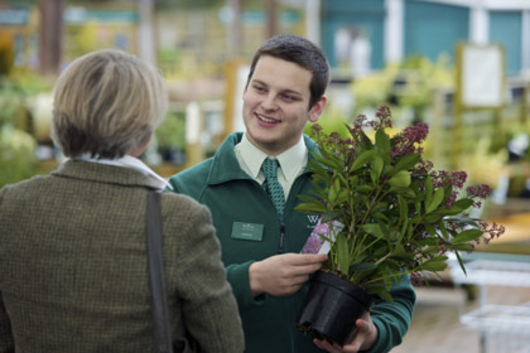
- Survey in 2013 found more than 70% of horticultural businesses cannot fill skilled vacancies, nearly 20% are forced to recruit overseas and almost 70% say career entrants are inadequately prepared for work.*
- As part of the on-going industry-wide campaign, Horticulture Matters, to close the green skills gap, the RHS will invest £3.2 million to increase its horticultural apprentice and training positions from 46 to 76 by 2025.
- The RHS also commits to invest a further £4.1 million in horticultural salaries by 2025. The pay increases will be permanent, continuing beyond 2025, to better reflect the skills and knowledge of horticulturally trained employees.
The dwindling number of people in the UK with horticultural skills represents a major challenge to the horticultural industry in trying to meet the growing demands placed on it. As part of the industry-wide ‘Horticulture Matters’ campaign to raise the profile of careers in horticulture, the RHS has committed to invest £7.3 million by 2025 into horticultural talent to help support the future of British Horticulture.
RHS Director General, Sue Biggs, says: “We’re in the fourth year of the industry’s Horticulture Matters campaign, to raise the profile of careers in horticulture and close the critical green skills gap, which threatens the future of British Horticulture.
“We have just completed a horticultural salary review to ensure we recognise the specialist skills and knowledge that professional horticulturists and horticultural scientists need to do their jobs, at the same time as making sure we’re building horticultural salaries in a sustainable way, both for ourselves and for the wider industry.
“The key issue that we, as an industry, need to resolve is that people still aren’t aware of the breadth of exciting and fulfilling career opportunities that the wonderful world of horticulture has to offer. We also need to continue getting better at going out into secondary schools and reaching wider audiences to raise the profile of careers in horticulture and to highlight career progression opportunities.”
The gardening charity has committed to increase the number of its horticultural apprentice and training positions from 46 to 76 over the next 10 years to encourage and support more people to enter the horticultural industry and to provide more opportunities for them within it. This will see the charity investing a further £3.2 million into these new horticultural roles to help kick-start people’s employment in horticulture, a career to be proud of.
The RHS conducted its review** into horticultural salaries across the industry to help the charity determine how it might advance its horticultural salaries at a sustainable rate. The RHS has now committed to ensuring that all professionally qualified RHS horticulturists and horticultural scientists are paid at the upper end of the horticultural industry pay scale, and has committed to invest an additional £4.1 million by 2025 to achieve this.
In conducting this review, the RHS focused on areas where there is a skills gap and where the industry struggles to recruit trained horticulturists. Curatorial and horticultural employees, including apprentices and trainees, and horticultural scientists will be the main beneficiaries of the increase with the pay progression ranges for each role increasing by between 5% and 10%, which is in addition to the Society’s standard 2% pay increase for 2015. All pay increases will be permanent.
Sue Biggs, continues: “This pay review reflects the value we place on our professional horticulturists and will take our pay levels from the average industry rate to the upper end of the horticultural pay scale. A Level 1 horticulturist’s starting salary will now be about £19,000 and a Garden Manager will be able to earn up to £40,000.
“As part of this initiative, we have also been able to increase our starting salaries for apprentices and trainees to £14,000 and £15,456 respectively, and will be creating 30 more of these positions too. We have introduced new pay progression scales into our Science division so that our horticultural scientists can follow a career path from entry level at £18,360 up to £45,900 and beyond for senior management positions.
“We’ll now be increasing our work to promote and raise the profile of the breadth of fantastic career opportunities in this industry to teachers, business, industry, career changers and the wider public to continue our efforts to help close the skills gap.”
Alan Titchmarsh, who has supported and helped drive Horticulture Matters from the start, says: “While it’s not just the salary that attracts a person to a job, nor makes them stay, this acknowledgement of the importance of adequately rewarding horticultural skills demonstrates that the RHS is committed to playing its part in recognising the often underestimated value of horticulturists. I look forward to more initiatives coming from the RHS and the wider industry to continue the work of Horticulture Matters and raise the profile of careers that are currently undervalued for the skills they require and for the immense positive difference they make.”
*A survey of 200 horticultural businesses confirmed an alarming shortage of skilled professionals in UK horticulture for The Horticulture Matters 2013 report, which was presented to Government on 14 May 2013 at the House of Commons. The survey also found that 10% of vacancies take at least one year to fill. More than 80% of the survey respondents cited a poor perception of horticulture in schools and colleges as the issue, and 90% said it was because horticulture lacks career appeal.
** During 2014 the RHS undertook a review of horticultural salaries throughout the industry by using salary information from 23 individual organisations and analysing nearly 150 horticultural job advertisements and over 200 responses from a Professional Gardeners Guild Survey. The RHS benchmarked these findings against its own roles that require a horticultural qualification in order to carry out the work.